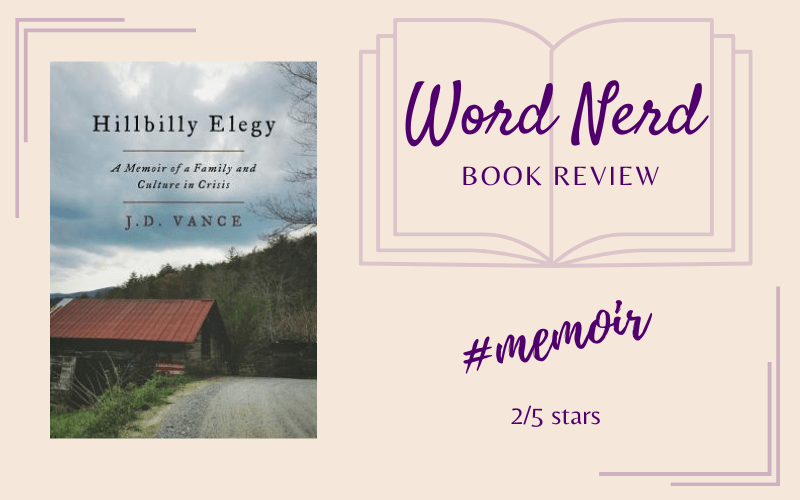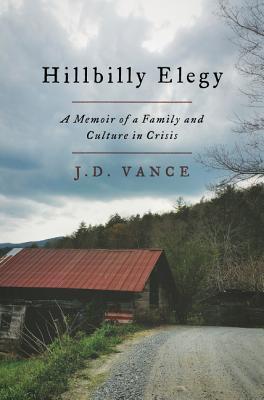For years, I’ve been meaning to read Hillbilly Elegy by JD Vance. This June, knowing Vance was on the short list for the Republican VP nomination, I finally tackled it. Hillbilly Elegy is a short read. To understand it best, you should read it yourself, but here are my thoughts to get you started.
The Premise
In Hillbilly Elegy, Vance describes his coming of age in Middletown, Ohio. His mother was a drug addict, and her parenting was erratic. Therefore, Vance was largely raised by his mother’s parents. Traumatic events and unpredictability colored Vance’s upbringing, but he also had two steady, if not perfect, family members watching over him, and he credits them for his success. As a young adult, Vance served in the Marines before he attended college at Ohio State and law school at Yale. Vance has a lot to say about his rise from Appalachian crisis, but unfortunately, he bases most of his assumptions on his own limited experience, and that’s where the book falls short.
What I liked
Vance’s writing is easy to read, and I was intrigued especially by the matriarch of his family, his maternal grandmother or “Mamaw.” Brusque and prone to profanity, Mamaw demonstrates strength and persistence. Vance credits his success to her sacrifices and support, as well he should. I was also intrigued by Vance’s assumptions about Appalachian attitudes on politics and government. For example, Vance says, “Much of my family’s, my neighborhoods, and my community’s identity derives from our love of country… If Mamaw’s second God was the United States of America, then many people in my community were losing something akin to a religion.”
This quote summarizes one of Vance’s keys points about Appalachia while also highlighting one of his memoir’s flaws: Vance takes what was true for his Mamaw and applies it to thousands of people, without data behind it. Hillbilly Elegy should have stuck to memoir and left the social commentary to someone who did more homework.
What I didn’t like
Vance’s experiences as a child growing up in Appalachia make for a compelling memoir along the lines of The Glass Castle by Jeannette Walls. However, problems arise when Vance uses his own narrow experience to describe an entire geographic area and a huge socio-economic demographic.
I prefer the perspective of author David Joy, who writes novels about the small town where he lives in western North Carolina. At a recent speaking event, Joy said, “People call me an Appalachian writer, but I’m not. I write what I know, which is about one small town in the mountains of North Carolina. Appalachia includes several states, and I don’t know anything about most of them.” In fact, according to the Appalachian Regional Commission, the Appalachian Region includes 423 counties across 13 states. That’s a lot more than Middletown, Ohio.
Criticisms of Hillbilly Elegy abound, including some from the late Frank Killgore, a lawyer from the coalfields of southwest Virginia. In 2022, Kilgore self-published a retort to Vance’s memoir titled J.D. Vance is a Fake Hillbilly. According to Dwayne Yancey of Cardinal News, Kilgore criticized Vance of dwelling on his own “unhappy upbringing and childhood” to smear the whole region of Appalachia. Kilgore worried that Vance’s best seller would deter desperately needed investment in the region.
Other criticisms include how Vance neglects to consider immigrants, people of color, and other marginalized groups in his social commentary.
I share the concerns of Kilgore and others. I’ve lived in southwest Virginia, a part of Appalachia, for over 23 years. Thanks to a job in home health, I’ve visited hollers and double wide trailers needing maintenance. As a school volunteer, I’ve read with children whose parents do not have the time or wherewithal to read with them at home. I don’t deny that poverty affects our region, but wealth does too, just not necessarily the material kind.
People matter here. When tragedy or illness strikes, community members gather around those suffering. If a fire destroys a home, clothes and furniture appear. If someone needs cancer treatment, neighbors provide food, offer child care, and cut the grass. People take pride in our community, and contrary to Vance’s generalizations about the white middle class, they work hard. Most of the farmers I know work two jobs, because farming alone doesn’t pay the bills. Students graduate from high school and train to become teachers, nurses, and accountants who return to serve the people they’ve known since toddlerhood. Local education programs offer pathways into good paying jobs in skilled labor and industry. There’s also a thriving creative culture that includes music and visual arts. If getting outside in nature is your jam, we’ve got gorgeous mountains to hike and rivers to paddle.
Word Nerd Recommendation
If you care about politics and society, give Hillbilly Elegy a read. Vance could be leading our country in a few months, and it would be good to familiarize yourself with his writing. However, I take Vance’s written, and spoken, words with a grain of salt. He was once a staunch critic of Trump, even comparing him to Hitler. Now he’s his running mate. In Hillbilly Elegy, Vance claims to be concerned about the plight of the white working class in Appalachia, but based on his current company, actions, and speeches, I fear the only person Vance cares about is himself.
Some other reviews of this controversial memoir:
- from The Guardian
- from Book Riot
Have you read Hillbilly Elegy? What did you like and dislike about it? Please note, I’m interested in discussion about the book, not broad political debate.
Thanks for getting nerdy with me!




Thanks for the explanation of your bias at the end of this review. It explains a lot about your opinion of the book.
I can only expect that JD Vance did some research on the history of the area where he grew up and that his descriptions of the migrations from that area to better economic conditions in Ohio are accurate. Your comment on his judgements and statements about “a large group of people” in itself is a broad statement which is a weak judgement about the book.
That being said, my takeaway from this book is that it is more about the general plight of people in economically poor areas, the strife they encounter and more specifically, it is what I would deem a cathartic for JD. You could extrapolate these experiences to anywhere/any group in the country. My own experience growing up was in a similarly tumultuous household, with an economically challenged family and I lived in what could be called a well-to-do area. However, I went on to receive an engineering degree and an MS degree from Yale University.
If the stories that JD imparts in his book are indeed true, I have the utmost respect and admiration for the man and almost find it incredible that he was able to make his way out of poverty, let alone to Vice President. This is the American Dream at its essence and should be heralded – not scoffed at.
I would suggest that with these thoughts in mind you might re-read the book in a different light…unless maybe you have a silver spoon, that you were born with in your mouth, impede your vision.
Where else is JD supposed to get his perspectives and judgements from? Someone else? He’s speaking to how his experience shaped him. No, everyone in Appalachia is not the same but many have experienced the same things as JD. Just because you don’t agree with his judgements, based on his experience, doesn’t make him wrong or not meaningful to others. I’m pretty sure you began reading this book based on a biased opinion about JD which colored your review.
Thank you for reading and commenting, Mr. Hensley! You are right, only J.D. Vance can describe how his experienced shaped him. And I found that experience interesting. But he needs data and research to support how the “Appalachian experience” shapes the thousands of people who are not him. And he doesn’t include that with his social commentary.
Even before I read this comment I felt the same. Unless you are expecting a piece of sociological research from where else do you suppose JD derived his material apart from personal experience. I also think this piece was written with preconceived critical intent.
I actually prefer the late Frank Kilgore’s book to Vance’s. “Elegy” struck me as a pretty self-serving memoir.
Aloha Julia, it is apparent that your political biases color your review of JD Vance’s Hillbilly Elegy. What he has written is HIS experience. Your review and the power of YOUR words is one-sided at best and its intent is to sway people away from casting a vote in his direction.
Thank you Leslie for reading and taking the time to comment. I agree JD Vance wrote about his experience, which is definitely true to him and an interesting story. What I didn’t like about the memoir was him taking his experience and extrapolating it to a huge region and group of people. He makes judgements and statements about a large group of people using only the narrow lens of his own experience to justify his social statements. That’s where I find fault with the memoir. Thanks again for commenting!